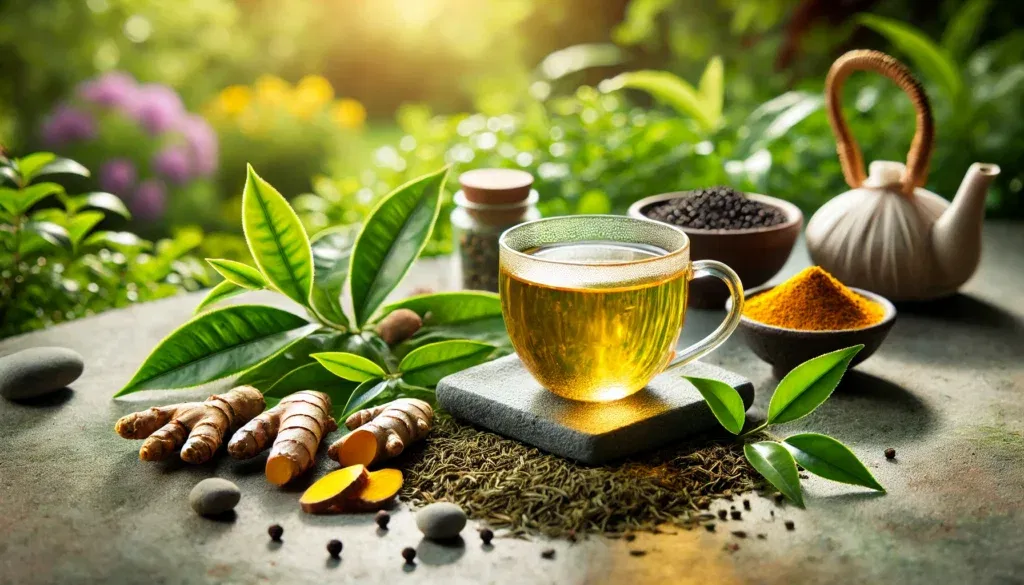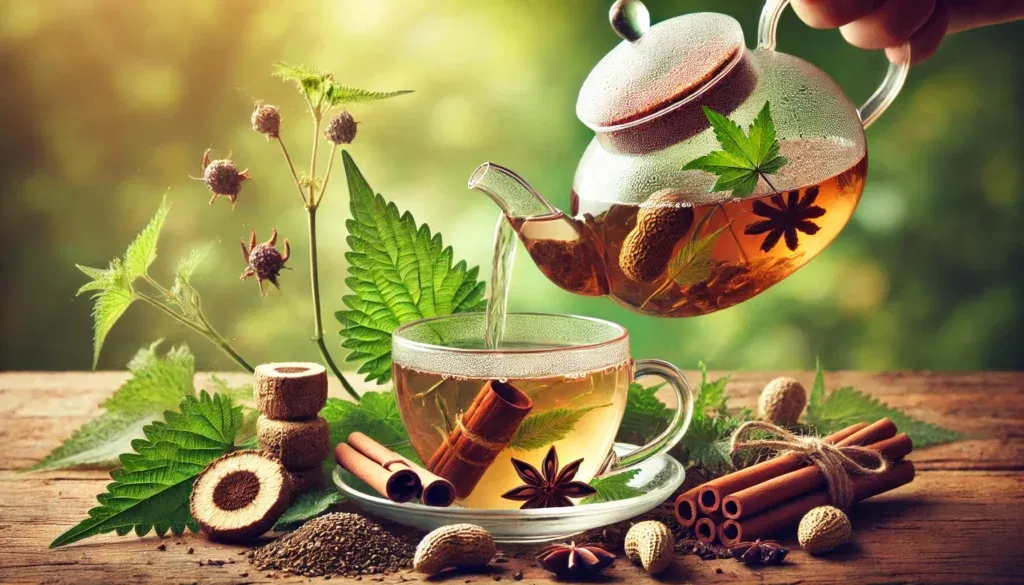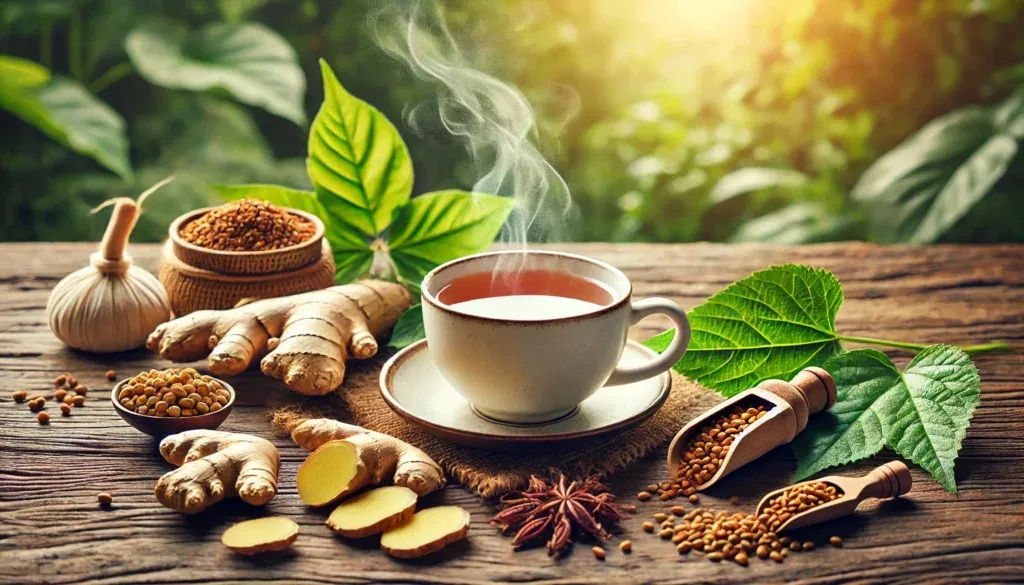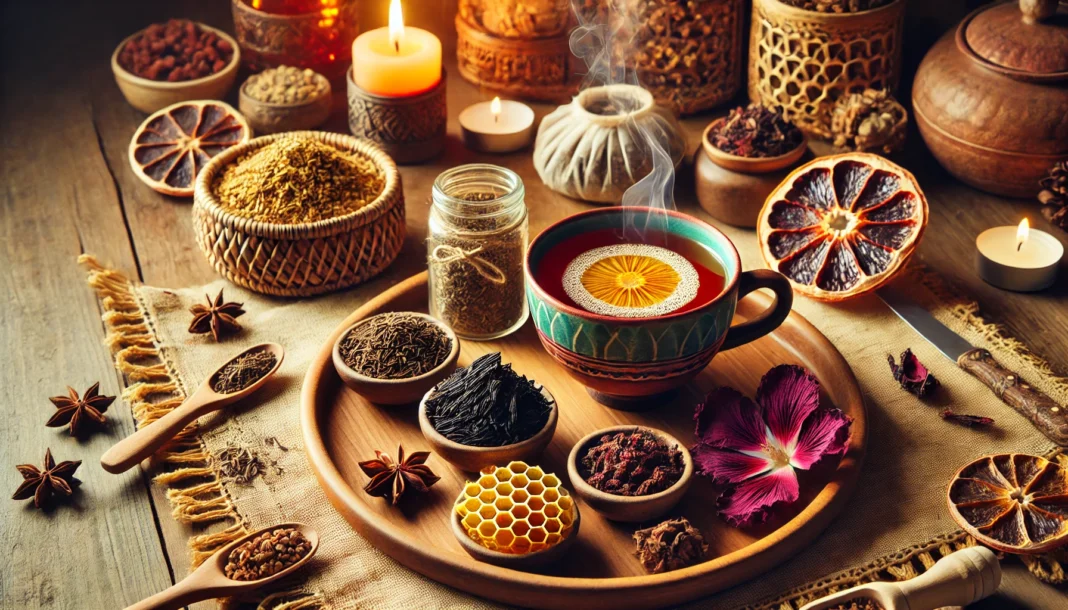Maintaining optimal testosterone levels is a crucial aspect of men’s health, influencing everything from energy levels and muscle mass to libido and overall well-being. While synthetic treatments exist, many men seek natural alternatives to support their hormonal health. One increasingly popular method is the consumption of specific herbal teas known for their potential to enhance testosterone production. Throughout history, cultures across the world have used various teas and herbal infusions to promote vitality, strength, and hormonal balance. Today, modern research supports many of these traditional remedies, highlighting the power of natural compounds in boosting testosterone.
You may also like: How to Increase Testosterone Levels Naturally: Science-Backed Strategies for Men’s Health & Longevity
In this article, we will explore the best tea for testosterone, delving into their unique properties, the science behind their benefits, and how to incorporate them into your daily routine. Additionally, we will examine African herbs for testosterone, a lesser-known yet highly effective category of natural remedies used in traditional medicine for centuries. By the end of this guide, you will have a well-rounded understanding of how these natural teas can support your hormonal health and overall vitality.

Understanding the Role of Testosterone in Men’s Health
Testosterone is the primary male sex hormone, playing a vital role in various physiological functions. While both men and women produce testosterone, men require significantly higher levels to support essential bodily processes. This hormone influences muscle growth, bone density, red blood cell production, and even cognitive function. However, as men age, testosterone levels naturally decline, leading to fatigue, reduced muscle mass, increased fat accumulation, and decreased libido.
Various lifestyle factors contribute to declining testosterone, including poor diet, stress, lack of sleep, and sedentary behavior. While medical interventions such as testosterone replacement therapy (TRT) are available, many men prefer natural approaches to hormone optimization. One such method involves incorporating herbal teas known for their hormone-boosting properties. Specific herbs contain bioactive compounds that stimulate testosterone production, improve circulation, and reduce inflammation—key factors in maintaining healthy hormone levels.
How Herbal Teas Support Testosterone Levels
Herbal teas offer a simple yet effective way to support testosterone levels naturally. Unlike synthetic supplements, teas derived from medicinal plants provide a combination of vitamins, minerals, and antioxidants that work synergistically to enhance hormonal balance. Many of these teas help reduce cortisol levels, a stress hormone known to interfere with testosterone production. Others improve blood circulation, allowing better nutrient delivery to hormone-producing glands such as the testes and adrenal glands.
Furthermore, certain herbal teas possess adaptogenic properties, meaning they help the body adapt to stress and restore balance to hormonal systems. This makes them particularly useful for men experiencing hormonal imbalances due to chronic stress, poor sleep, or lifestyle factors. By incorporating testosterone-boosting teas into your routine, you can support your body’s natural ability to produce and maintain optimal hormone levels without the risks associated with synthetic interventions.
Top Herbal Teas for Boosting Testosterone
Several herbal teas have been traditionally used to enhance male vitality and hormone health. Below, we explore the most effective options, backed by both traditional wisdom and scientific research.
Fenugreek Tea
Fenugreek is a well-known herb used in Ayurvedic and traditional medicine for its ability to enhance male performance and overall vitality. The seeds of this plant contain compounds known as furostanolic saponins, which have been shown to stimulate testosterone production. Studies indicate that fenugreek supplementation can lead to increased strength, libido, and energy levels in men. Drinking fenugreek tea allows for a natural intake of these beneficial compounds, providing a gentle and sustained approach to hormonal balance.
Additionally, fenugreek helps regulate blood sugar levels, which is essential for maintaining stable testosterone production. Insulin resistance has been linked to lower testosterone levels, making fenugreek tea an excellent choice for men looking to support both metabolic and hormonal health.
Ginger Tea
Ginger is a potent medicinal root with numerous health benefits, including its ability to enhance testosterone levels. Research suggests that ginger supplementation can improve testicular function and increase testosterone production by stimulating luteinizing hormone (LH), which signals the testes to produce more testosterone. Additionally, ginger is rich in antioxidants and has strong anti-inflammatory properties, which help protect the testes from oxidative damage.
Ginger tea is also known to improve blood circulation, ensuring that essential nutrients reach the hormone-producing glands efficiently. This increased circulation plays a crucial role in supporting reproductive health and maintaining optimal testosterone levels. The warm and spicy flavor of ginger tea makes it a comforting yet powerful addition to any testosterone-boosting regimen.
Ashwagandha Tea
Ashwagandha, an adaptogenic herb widely used in Ayurvedic medicine, has gained recognition for its ability to reduce stress and enhance hormonal health. Chronic stress is a major contributor to low testosterone levels, as high cortisol levels suppress the body’s ability to produce testosterone. Ashwagandha tea helps lower cortisol levels, thereby creating a more favorable environment for testosterone production.
Studies have demonstrated that men who take ashwagandha supplements experience significant increases in testosterone levels, muscle mass, and overall strength. Drinking ashwagandha tea provides a natural way to harness these benefits while also promoting relaxation and mental clarity.
Moringa Tea
Moringa, often referred to as the “miracle tree,” is packed with essential nutrients, antioxidants, and bioactive compounds that support hormonal balance. African and Indian cultures have long used moringa for its medicinal properties, including its ability to enhance male fertility and testosterone levels. Rich in vitamin D, magnesium, and zinc—three essential nutrients for testosterone production—moringa tea serves as a natural testosterone booster.
Additionally, moringa contains plant sterols that help modulate hormone production, making it an excellent choice for men experiencing hormonal imbalances. Regular consumption of moringa tea can improve energy levels, stamina, and reproductive health, making it a valuable addition to a testosterone-boosting regimen.
African Herbs for Testosterone
African herbal medicine has a rich history of using plant-based remedies to enhance male vitality and overall well-being. Several African herbs have gained recognition for their ability to support testosterone levels naturally. Below are some of the most potent African herbs for testosterone enhancement.
Tongkat Ali (Longjack)
Native to Southeast Asia and parts of Africa, Tongkat Ali is a powerful herb known for its testosterone-boosting effects. Traditionally used as an aphrodisiac and vitality enhancer, this herb contains bioactive compounds that stimulate testosterone production. Studies show that Tongkat Ali supplementation can improve muscle strength, reduce stress, and enhance male reproductive health. Drinking tea made from Tongkat Ali extract provides a convenient way to benefit from its potent properties.
Fadogia Agrestis
Fadogia Agrestis is a lesser-known African herb with strong potential as a natural testosterone booster. Used in traditional Nigerian medicine, this plant has been shown to enhance testosterone production by increasing the activity of luteinizing hormone. Research suggests that Fadogia Agrestis may improve libido, energy levels, and muscle growth, making it an excellent addition to a natural testosterone-supporting regimen.
Tribulus Terrestris
Commonly found in Africa and parts of Asia, Tribulus Terrestris is renowned for its ability to enhance male hormonal health. This herb contains steroidal saponins, which play a role in stimulating testosterone production. While research on Tribulus Terrestris remains mixed, many men report increased energy, stamina, and libido when consuming this herbal tea regularly.

Frequently Asked Questions (FAQ) on Testosterone-Boosting Teas and African Herbs
1. How do different types of tea impact testosterone levels?
The best tea for testosterone support varies depending on its ingredients and antioxidant content. Some teas, such as green tea, contain catechins that may help regulate hormone levels, while others, like ashwagandha tea, actively support testosterone production by reducing stress-related cortisol levels. Certain herbal teas, including fenugreek and ginseng, have been studied for their potential to enhance free testosterone availability in the body. Drinking these teas in combination with a balanced diet and exercise regimen can optimize hormone levels over time. It’s also important to choose organic teas without additives to ensure maximum potency and effectiveness.
2. Are African herbs for testosterone safe for daily consumption?
Many African herbs for testosterone enhancement, such as Tongkat Ali, Fadogia agrestis, and Yohimbe, are generally safe when consumed in appropriate doses. However, individual tolerance varies, and some herbs may cause side effects such as increased heart rate or digestive discomfort. Consulting a healthcare professional before incorporating these herbs into your daily routine is advisable, particularly for individuals with underlying health conditions. Additionally, sourcing high-quality, third-party-tested supplements or teas ensures safety and effectiveness. When used responsibly, these herbs can provide a natural alternative to synthetic hormone boosters.
3. What is the best tea for testosterone that also supports overall health?
The best tea for testosterone should not only boost hormone levels but also provide additional health benefits such as improved circulation, reduced inflammation, and enhanced metabolism. Rooibos tea, a caffeine-free South African herbal tea, contains flavonoids that may help regulate hormone production while supporting heart health. Other herbal options, such as ginseng tea, offer adaptogenic properties that enhance energy and resilience to stress. Drinking a variety of these teas throughout the week can create a well-rounded approach to testosterone support. Choosing teas rich in antioxidants further promotes cellular health and longevity.
4. How do African herbs for testosterone compare to conventional testosterone-boosting supplements?
African herbs for testosterone enhancement often provide a more natural and holistic approach compared to synthetic supplements. Herbs like Mucuna pruriens and Bulbine natalensis work by stimulating the body’s own testosterone production rather than introducing external hormones. In contrast, synthetic testosterone boosters may come with a higher risk of dependency and side effects such as hormonal imbalances. Additionally, African herbs are often rich in micronutrients that contribute to overall vitality beyond just hormone regulation. While both natural herbs and synthetic supplements can be effective, many individuals prefer herbs due to their long history of traditional use and fewer side effects.
5. Can drinking the best tea for testosterone enhance muscle growth?
While drinking the best tea for testosterone alone won’t lead to significant muscle gains, it can support muscle growth when combined with strength training and proper nutrition. Teas containing compounds such as epicatechins (found in green tea) or saponins (found in tribulus terrestris tea) may aid in muscle recovery and protein synthesis. Additionally, herbal teas that reduce cortisol, such as ashwagandha tea, can prevent muscle breakdown caused by chronic stress. Maximizing testosterone levels naturally through tea consumption helps create an optimal internal environment for muscle development. However, consistent exercise and a protein-rich diet remain the most critical factors for building lean muscle mass.
6. Do African herbs for testosterone also improve libido and sexual health?
Many African herbs for testosterone, such as Yohimbe and Tongkat Ali, have been traditionally used as natural aphrodisiacs. These herbs work by increasing blood circulation and nitric oxide production, which can enhance erectile function and libido. Additionally, they may help balance other hormones that influence sexual health, such as cortisol and dopamine. Some users report increased energy, stamina, and overall sexual performance when incorporating these herbs into their diet. While results vary, regular use of high-quality herbal teas or extracts can contribute to long-term improvements in sexual well-being.
7. Are there any dietary considerations to enhance the effects of testosterone-boosting teas?
To maximize the benefits of the best tea for testosterone, it’s essential to maintain a diet rich in essential nutrients such as zinc, magnesium, and healthy fats. Foods like eggs, fatty fish, avocados, and leafy greens support hormone production and complement the effects of herbal teas. Avoiding excessive sugar, alcohol, and processed foods is also important, as these can contribute to hormonal imbalances. Additionally, drinking these teas alongside a well-hydrated lifestyle ensures optimal absorption of their bioactive compounds. A comprehensive approach that combines tea consumption with a nutrient-dense diet will yield the best results.
8. How long does it take to notice the effects of African herbs for testosterone?
The effects of African herbs for testosterone vary depending on the herb, dosage, and individual response. Some herbs, such as Tongkat Ali, may produce noticeable effects within a few weeks, while others like Mucuna pruriens may require more prolonged use to see significant benefits. Consistency is key, as natural herbal remedies work gradually by supporting the body’s endocrine system. Additionally, factors such as age, stress levels, and overall health influence how quickly results manifest. Patience and adherence to a well-rounded lifestyle will enhance the long-term benefits of these herbs.
9. Can women also benefit from drinking the best tea for testosterone?
Although testosterone is primarily associated with male health, women also require balanced testosterone levels for energy, mood stability, and muscle maintenance. Certain teas, such as spearmint tea, may help regulate excess testosterone in women with conditions like polycystic ovary syndrome (PCOS). However, teas containing adaptogenic herbs like ashwagandha and maca can provide a balanced approach by supporting overall hormone health. Women interested in these teas should monitor their hormonal response and consult a healthcare professional if needed. A moderate and personalized approach ensures optimal benefits without unwanted side effects.
10. Are there any potential interactions between testosterone-boosting teas and medications?
Some herbs used in the best tea for testosterone formulations may interact with medications, particularly those for blood pressure, diabetes, and hormone therapy. Herbs like Yohimbe and Ginseng, for instance, can influence blood circulation and may not be suitable for individuals taking anticoagulants. Additionally, certain herbal teas may affect insulin sensitivity, requiring adjustments for those managing blood sugar levels. It’s always recommended to consult a healthcare provider before incorporating these teas into a medication regimen. Being informed about potential interactions ensures safe and effective use of herbal remedies.

Conclusion: Harnessing the Power of Tea for Hormonal Health
Incorporating herbal teas into your daily routine is a simple and natural way to support testosterone levels and overall well-being. By choosing the best tea for testosterone, you can enhance your body’s ability to maintain optimal hormonal balance while also benefiting from the additional health advantages these herbs provide. African herbs for testosterone offer another layer of support, drawing from centuries of traditional medicine to enhance male vitality.
Making small yet consistent changes, such as drinking testosterone-boosting teas, engaging in regular exercise, and managing stress levels, can significantly impact your hormone health. By prioritizing natural solutions, you can cultivate long-term well-being and vitality without relying on synthetic interventions.
testosterone-boosting herbs, herbal remedies for men’s health, adaptogenic herbs for testosterone, natural ways to increase testosterone, herbal teas for male vitality, moringa benefits for testosterone, best adaptogens for men, fenugreek tea benefits, traditional African medicine for men, ginger tea for testosterone, hormone-balancing teas, libido-boosting herbal teas, stress-reducing adaptogens, luteinizing hormone stimulation, natural aphrodisiacs, herbal support for testosterone, anti-inflammatory herbs for men, best herbs for stamina, testosterone-enhancing drinks, plant sterols and hormone health
Further Reading:
Herbs, Vitamins, and Supplements for Testosterone
Top 6 Herbs to Boost Testosterone
Disclaimer: The information provided in this article is for general informational purposes only. The content does not constitute professional advice of any kind, including but not limited to medical, legal, or financial advice. HisHealthMag and its contributors make no representations or warranties regarding the accuracy, completeness, or reliability of the information presented. Always seek the advice of a qualified professional for any specific concerns or questions you may have. Neither HisHealthMag nor its authors assume any responsibility or liability for any actions taken based on the information provided in this article. The views and opinions expressed are those of the author(s) and do not necessarily reflect the official policy or position of HisHealthMag.





